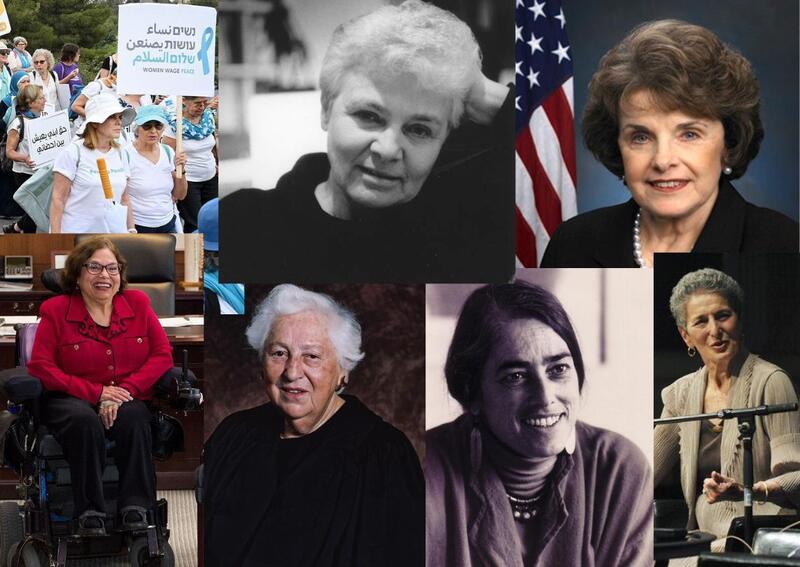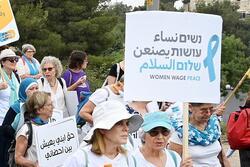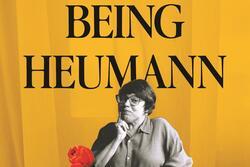Jewish Women Whose Memories I’m Carrying into 2024
As 2023 drew to a close, I felt the heavy weight of the tragic losses, violence, and division that have defined the past several months. The year also brought the deaths of several powerful and influential Jewish women, whose insights and voices changed the world and are all the more painful to lose in this difficult time.
Luckily, we at JWA are in the business of remembering. As I look into 2024, I am calling on their memories to spark my belief that a different world is possible.
Judy Heumann was a founder and lifelong leader of the disability rights movement. Her activism was varied and far-ranging, from suing to get her public school teacher’s license, to leading a 26-day takeover of a San Francisco federal building, to helping develop key disability rights legislation, including the Americans with Disabilities Act. She hoped to be remembered as “a change agent, a fighter, and a collaborator—as setting a big table where all are welcome and invited.”
Margot Stern Strom combined her observations of racism growing up in the Jim Crow South and her awareness of her own lack of knowledge about the Holocaust into a powerful anti-hate educational program. Facing History and Ourselves, which she co-founded in 1976, became a global organization that brings a moral lens to history education and has trained generations of students to be “upstanders,” not bystanders.
Nechama Tec brought her own experience as a hidden child during the Holocaust to her scholarship. In both memoir and sociological studies, she illuminated the stories of rescuers, resistance, and survival, most famously in her book Defiance, about the Bielski partisans, which was made into a feature film starring Liev Schreiber and Daniel Craig.
In her long political career, from San Francisco Board of Supervisors to mayor of San Francisco to California Senator, Dianne Feinstein broke several glass ceilings. Though her final years in the Senate were marred by accusations of mismanagement and decline, she led for more than 30 years on issues ranging from gun control to hate crimes to HIV/AIDS research to health care reform to immigration.
Evelyn Fox Keller was a scientist working in theoretical physics and mathematical biology until the rise of feminism in the 1970s prompted her to turn her scientific analysis to the ways gender ideology shapes scientific inquiry and concepts. As she told The Boston Globe in 1986, “I am not saying that women will do a different kind of science. I am saying when there are more women in science, everybody will be free to do a different kind of science.”
Alice Shalvi, one of the namesakes of JWA’s Shalvi/Hyman Encyclopedia of Jewish Women, was an indefatigable and visionary educator and activist. Born in Germany and raised in England, she moved to Israel as a young woman in 1949 at age 23. Through her many leadership roles—including as a pioneering English professor, the principal of the Pelech School for girls, and a founder of the Israel Women’s Network—she dedicated her life to creating a State of Israel that would live up to her ideals. She died just days before October 7, and her leadership is an aching absence at this difficult time.
Vivian Silver, a lifelong feminist and peace activist who made aliyah from Canada in the 1970s, was murdered at Kibbutz Be'eri on October 7. A founder of Women Wage Peace, Vivian was committed to bringing Jews and Palestinians together to build a shared society; she participated in a final march on October 4. She directed the Negev Institute for Strategies of Peace and Development and co-founded the Arab-Jewish Center for Equality, Empowerment and Cooperation with a Bedouin leader. Even in her retirement, she volunteered for Road to Recovery, driving Palestinian cancer patients from Gaza to Jerusalem for treatment. Initially believed kidnapped and held hostage by Hamas, her body was identified more than a month later in the kibbutz she loved and helped build—literally, serving as the director of construction for a time. To me, she represents not only the many Jewish women killed on October 7 whose names we don’t know, but also the urgent drive for peace.
Nobel Prize-winning poet Louise Glück is known for combining autobiographical, mythological, and biblical themes in her poetry. She believed in the importance of writing for readers, their common humanity at the forefront. Though an intensely private person, her poetry could be confessional, as she explored themes of family, trauma, and loss.
Natalie Zemon Davis was a pioneering historian of early modern Europe, known for her focus on ordinary people, especially marginalized groups like women. She was particularly interested in encounters across difference, writing about the interactions of Christians, Jews, and Muslims. She herself liked to cross boundaries in her work, drawing creatively on several disciplines. She also combined politics and profession, advocating for childcare for university employees and helping to found women’s studies programs at Berkeley and Princeton. She inspired generations of feminist scholars and helped build the foundation for JWA’s work.
Eva Kollisch escaped Austria in 1939 as a girl on the Kindertransport, eventually reuniting with her family in the US, where she worked in an auto factory and as a labor activist before becoming a pioneering feminist scholar and lesbian rights activist. She died at 98 in October, just months after her partner, the poet and labor activist Naomi Replansky, who died in January at 104, and sustained hope throughout her often-challenging life, as in the final lines of her late-in-life poem “The Oasis”:
Despair once cried: No passion’s left inside!
It lied. It lied.
May their memories be a blessing, and may we carry their irrepressible passion and legacies into 2024.








Thanks. Emouving.
Hope news young women will taken theirs place and possibly grows up in future peace.
💙